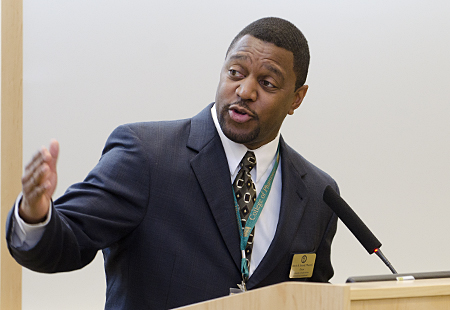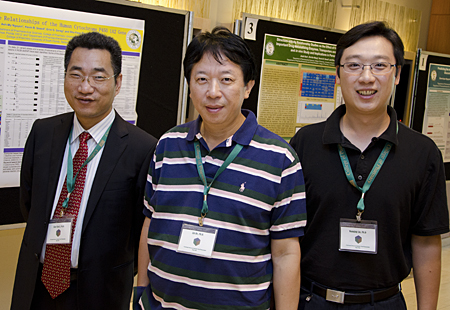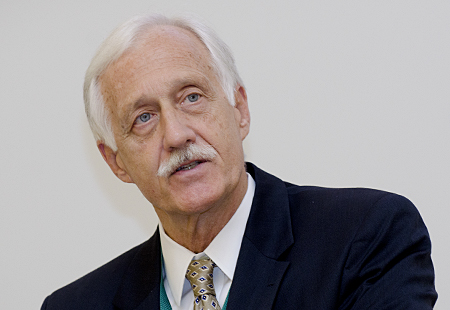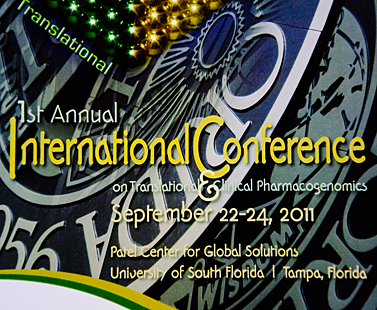USF a key player in emerging field of pharmacogenomics
The new College of Pharmacy brings together scientists blazing the trail to personalized medicine
The USF College of Pharmacy will be a major player in bridging the gap between the science of pharmacogenomics and its clinical applications, said Kevin Sneed, PharmD, dean of the USF College of Pharmacy at the 1st Annual International Conference on Translational & Clinical Pharmacogenomics.
Pharmacogenomics is the study of how genetic variation among individuals may be used to predict how different people will respond to medicines – whether it’s a good response, a bad response, or no response at all. The goal is to optimize patient therapy by eliminating trial and error prescribing.
The USF College of Pharmacy has integrated translational pharmacogenomics into its innovative interdisciplinary curriculum, making the emerging science one of the pillars upon which the program was founded.

Kevin Sneed, PharmD, dean of the USF College of Pharmacy
“We intend to educate students and existing practitioners about the benefits of pharmacogenomics in the patient care and commercial laboratory setting,” Dr. Sneed said. “When it comes to marrying genomics to pharmacology, no one is in a better position than our faculty to advance this emerging scientific field.”
Dr. Sneed welcomed world-renowned scientists from the United States, Australia, Canada, South America and China to the inaugural conference, held Sept. 22-24, at USF’s Patel Center for Global Health Solutions.
While still in its infancy, pharmacogenomics holds promise for smarter drug selection and prescribing and the development of medications customized to more effectively and safely treat cardiovascular disease, asthma, depression and other conditions, as well as cancer.
Conference speakers covered a wide range of topics related to the future of this personalized medicine approach in which drugs and drug combinations would be optimized for each individual’s unique genetic makeup. They discussed the challenges of advancing the field, including economic, reimbursement, regulatory, technological and lack of physician education and awareness about pharmacogenomic testing.

L to R: Xiao-Tian Li, PhD, vice president of Obstetrics & Gynecology
Hospital, Fudan University in Shanghai, China; keynote speaker Dr. Lin He (center), PhD, dean of the Institute of Biomedical Sciences, Fudan University;
and Wanqing Liu, PhD.
Keynote speaker Dr. Lin He, dean of the Institute of Biomedical Sciences at Fudan University in Shanghai, China, spoke about the initiative of China’s Bio-X Institutes to recruit samples related to drug effectiveness and adverse drug reactions through affiliations with large hospitals in China. The researchers have also built a database housing several thousand variations of drug metabolized, drug transporter and target genes, with the goal of systematically analyzing four genes in different geographic Chinese populations that can influence drug effectiveness and adverse reactions.
“Just as no one size shoe can fit all feet, no one drug can fit all the genotypes for a disease,” Dr. He said. “With personalized medicine we can target disease precisely.”
USF Health cardiologist Leslie Miller, MD, spoke about the potential of genomic screening and development of personalized medicine to change the diagnosis and management of cardiovascular disease.
Dr. Miller, the Edward C. Wright Professor of Medicine and chair of the Department of Cardiovascular Sciences at USF Health, pointed to a recent survey of several thousand cardiologists. While only 6 to 7 percent indicated they used some aspect of pharmacogenomics in their practice today, three-fourths believed they would in 5 years, he said. “And more than 90 percent said in 10 years we will use genomics at the point of care to direct the selection and dosing of drugs based on genomic screening.”

Leslie Miller, MD, professor and chair of cardiovascular sciences at the
USF College of Medicine
Dr. Sneed lectured about the need to more quickly advance pharmacogenomic tests to the laboratory setting, using the example of statins.
Millions of Americans at high risk for heart attack and stroke could benefit from these cholesterol-lowering drugs, Dr. Sneed said, but 7 to 10 percent of patients prescribed the potentially life-saving medications suffer the adverse effects of muscle pain and weakness.
While pharmacogenomic laboratory tests are being developed to help identify which patients are more likely to experience significant adverse effects from statins, plans for their use are not widespread, Dr. Sneed said.
“From a business standpoint,” he said, “we need to figure out ways to make applying genomic screening in the clinical realm more convenient and revenue generating.”
Successfully harnessing the potential of pharmacogeonomics could lead to more cost-effective care, Dr. Sneed said. “We may be able to offset or prevent additional costs that result when a patient has to return to the physician’s office because a drug doesn’t work or has adverse effects or the patient winds ups in the emergency room with medication-related complications.”

In addition to Dr. Sneed and Dr. Miller, USF Health speakers at the international conference included Shyam Mohapatra, PhD, director of the USF College of Medicine Nanomedicine Research Center; Said Sebti, PhD, professor of oncologic sciences and director of the Drug Discover Comprehensive Research Center at Moffitt Cancer Center; Robert Deschenes, PhD, Fred Wright Professor of Cancer Biology and chair of the Department of Molecular Medicine; Andrew Borkowski, MD, associate professor of pathology and cell biology and chief of molecular diagnostics at James A Haley Veterans’ Hospital; Ambuj Kumar, MD, MPH, deputy director of the Center for Evidence Based Medicine and Outcomes Research; Shufeng Zhou, MD, PhD; and Vrushank Dave, PhD, Department of Pathology and Cell Biology.
Story by Anne DeLotto Baier, and photos by Eric Younghans, USF Health Communications

